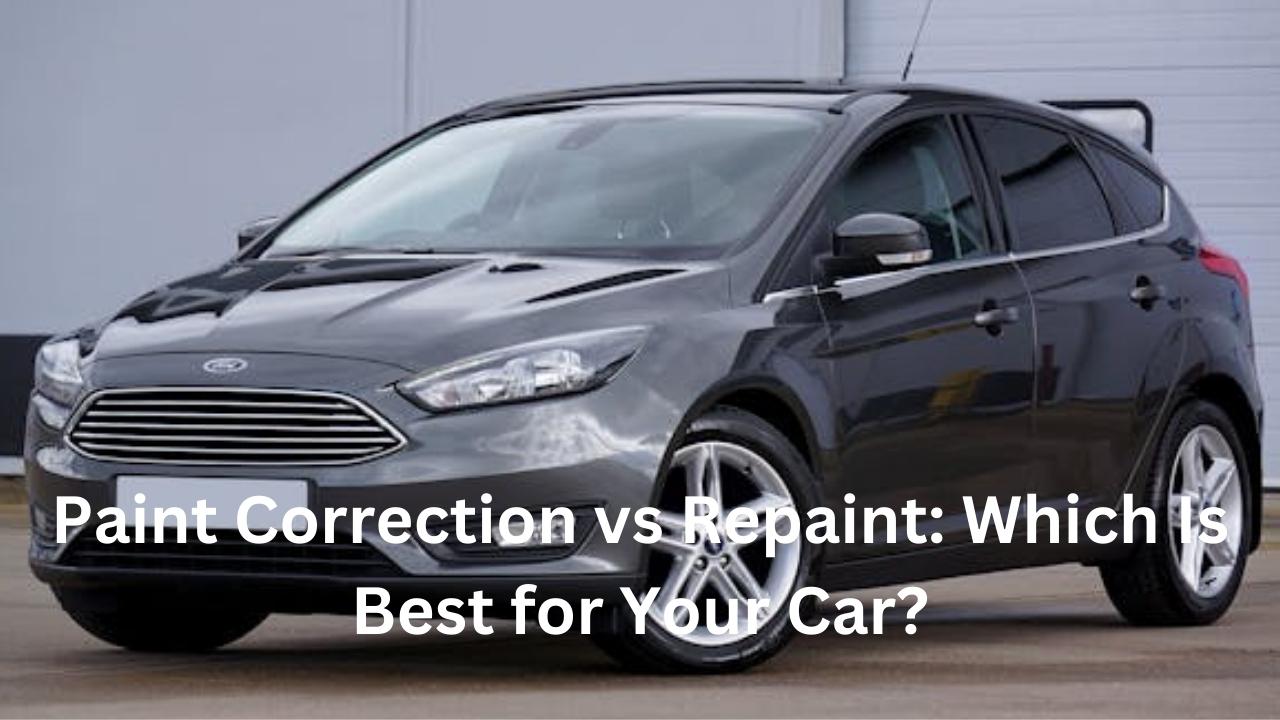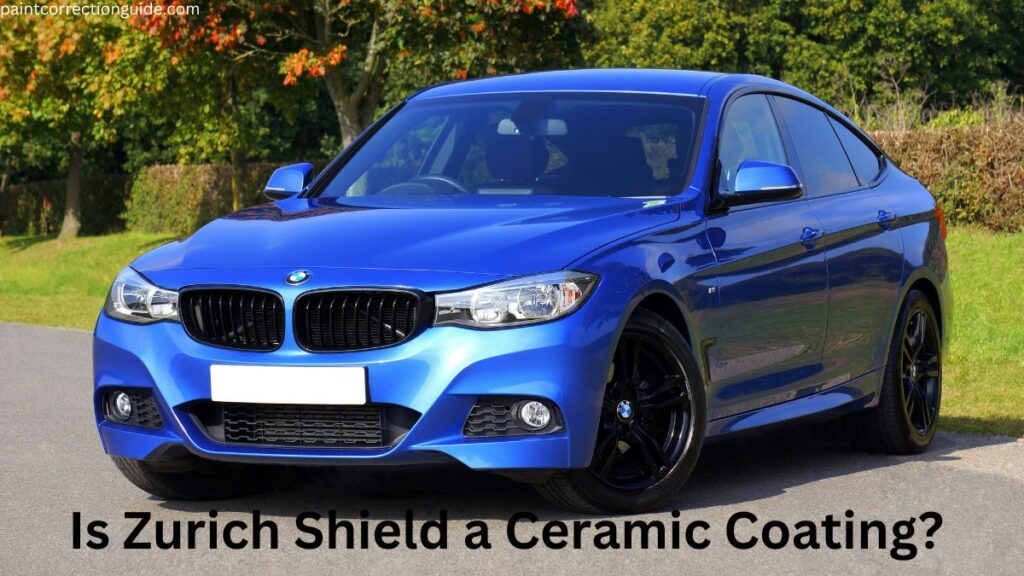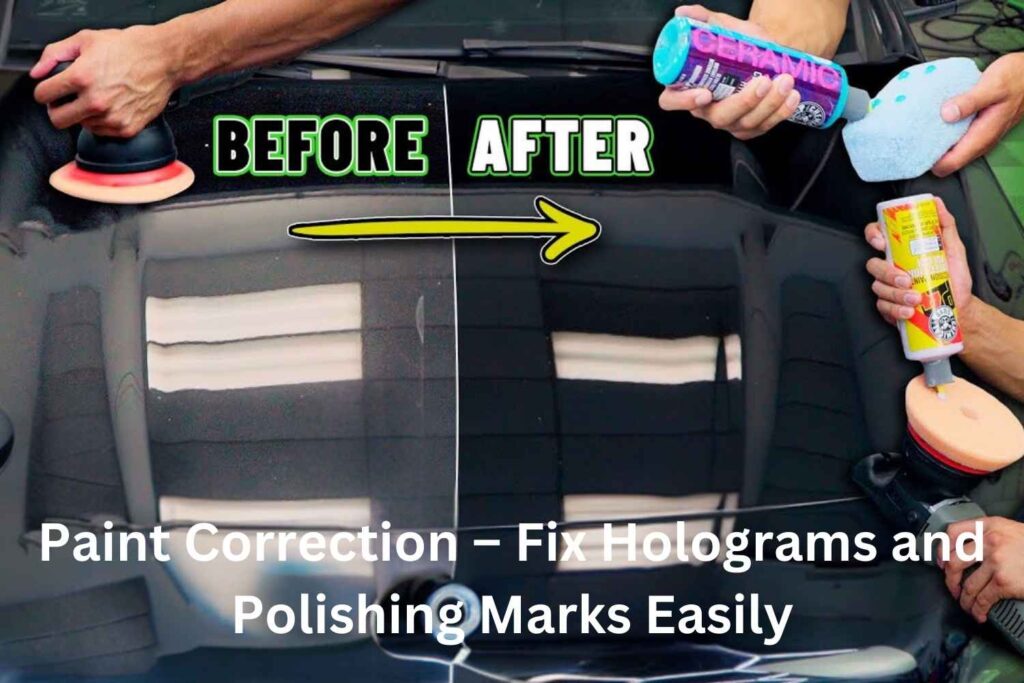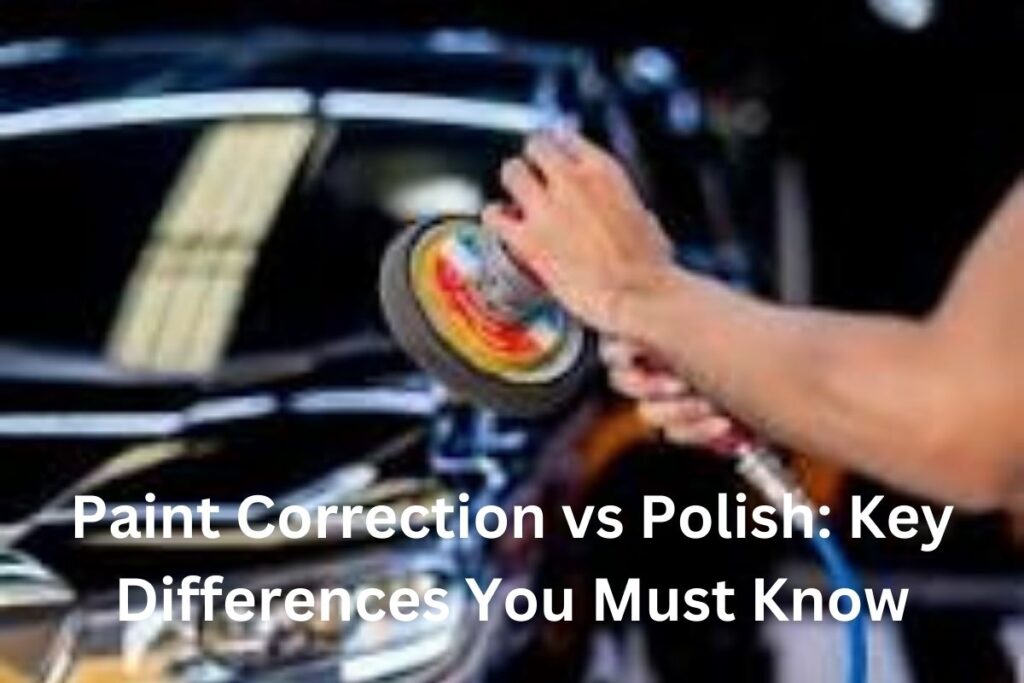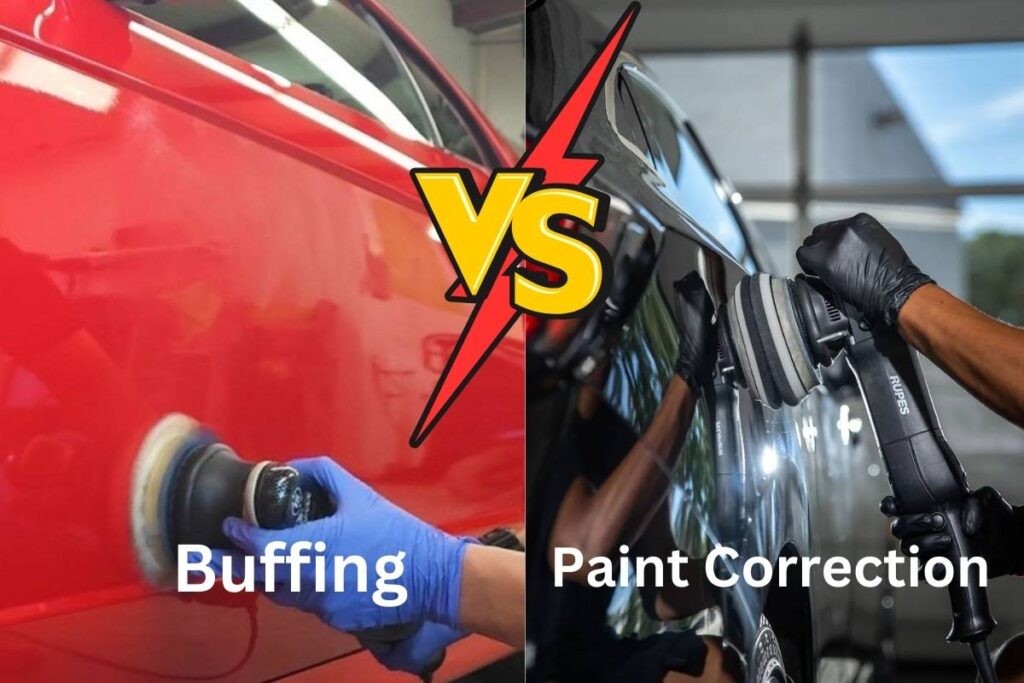Does your car’s paint look dull, scratched, or damaged? Deciding between paint correction vs repaint can feel tricky. Both options can improve the look of your car, but they work differently and solve different problems.
Paint correction fixes light scratches and swirl marks, while repainting handles deeper damage and gives your car a fresh new appearance. Picking the wrong option could waste your time and money.
This guide will explain the differences between paint correction vs repaint in simple terms. By the end, you’ll know which process is best for your car’s condition, budget, and goals. Let’s get started!
Table of Contents
ToggleWhat is Paint Correction?
Paint correction is a process to fix light scratches, swirl marks, and other small imperfections in your car’s paint. The goal is to restore the paint’s shine and smoothness without changing its color.
The process involves polishing the paint with special tools and compounds. These tools carefully remove a thin layer of the clear coat (the top layer of paint) to smooth out imperfections. Once the process is done, your car’s paint looks cleaner, shinier, and more even.
Paint correction works best for minor problems. If your car has light scratches, swirl marks from washing, or fading caused by the sun, paint correction can bring back its original look. It can also fix hazy or cloudy spots that can happen over time.
This process doesn’t remove deep scratches or other serious damage. It only works on the surface level, so it’s not a fix for major paint issues. If the damage is too deep, paint correction won’t help much. But for a car with minor imperfections, it’s a great way to get a smooth and glossy finish without spending a lot of money.
What is Repainting?
Repainting is the process of completely applying new layers of paint to your car. It’s a more involved process than paint correction. Repainting typically happens when the paint is heavily damaged or you want to change the car’s color entirely.
Repainting begins with preparation. The car’s surface must be cleaned and sanded to remove any old paint and make it smooth. After that, a primer is applied to help the new paint stick. Once the primer dries, multiple coats of paint are sprayed on. After that, a clear coat is added for extra protection and shine.
This process works well for cars with deep scratches, large paint chips, or areas that have rust. Repainting can also be the best option if you want to change your car’s color. It’s a way to restore the car’s look completely, giving it a fresh, flawless finish.
While repainting makes a car look brand new, it also costs more than paint correction. The process takes longer and needs professional help to get the best results. Mistakes in repainting can cause problems like mismatched colors or uneven coverage, so it’s important to choose a skilled professional.
Pros and Cons of Paint Correction
Paint correction can work wonders for minor imperfections, but it’s important to understand both the benefits and limits. Here’s a quick breakdown of what you get with paint correction.
Pros of Paint Correction
- Restores Shine: Paint correction brings back the glossy finish to your car’s surface. It removes swirls and fine scratches that dull the paint.
- Cost-Effective: This process is cheaper than a full repaint. For cars with only light damage, it’s an affordable option to restore the look.
- Quick Turnaround: Paint correction doesn’t take as long as repainting. You can usually get it done in a day or two, depending on the condition of the car.
- Preserves Original Color: Paint correction fixes imperfections without changing the car’s original color. It’s great if you like the current look but just want it to look better.
Cons of Paint Correction
- Not for Deep Damage: Paint correction works only for surface imperfections. It can’t fix deep scratches, dents, or rust spots.
- Requires Expertise: If not done properly, paint correction can cause more harm than good. Using the wrong tools or techniques can leave the paint looking worse.
- Temporary Fix: Paint correction doesn’t stop future damage. Your car might need another correction in a few months or years.
Key Specifications of Paint Correction
| Feature | Details |
|---|---|
| Cost | Lower than repainting, varies by damage |
| Time | Typically a few hours to 2 days |
| Effectiveness | Best for light scratches, swirl marks, fading |
| Color Change | No color change, original paint is preserved |
| Limitations | Cannot fix deep damage or rust |
| Maintenance | Needs reapplication after a few years |
Pros and Cons of Repainting
Repainting offers a complete makeover for your car’s appearance. It can fix serious paint issues but comes with both advantages and disadvantages. Let’s explore what you gain and what you should consider before repainting.
Pros of Repainting
- Restores Car Completely: Repainting can fix deep scratches, large chips, and even rust. It can make a car look as good as new, especially when the damage is severe.
- Color Change: Want a different color? Repainting is the way to go. It allows you to completely change the look of your car.
- Longer-Lasting: A fresh coat of paint can last for several years. This makes it a good option for fixing major damage.
- Prevents Future Damage: The new paint adds protection against the elements, keeping your car safe from rust and other issues.
Cons of Repainting
- Higher Cost: Repainting costs much more than paint correction. It involves more labor and materials, so the price is higher.
- Time-Consuming: Repainting takes longer. You’ll need to leave the car with a professional for several days, depending on the work needed.
- Possible Mistakes: Poor repainting work can cause issues like uneven paint or a mismatch in color. It’s important to choose an experienced professional.
- Not for Minor Damage: If your car only has small imperfections like light scratches or swirl marks, repainting might be overkill.
Key Specifications of Repainting
| Feature | Details |
|---|---|
| Cost | Higher than paint correction, more expensive |
| Time | Takes several days depending on the job |
| Effectiveness | Best for deep scratches, chips, rust, or color changes |
| Color Change | Allows full color change |
| Limitations | Overkill for light damage |
| Maintenance | New paint can last for years, but needs care |
Cost Comparison: Paint Correction vs Repainting
Cost is an important factor to consider when deciding between paint correction and repainting. Both options vary greatly in price, depending on the work involved. Here’s how the costs compare:
Cost of Paint Correction
Paint correction is the more affordable option. The price usually depends on the extent of the damage and the type of correction needed. For light scratches or swirl marks, paint correction can cost anywhere from $100 to $500. The cost will increase if the car has more damage or requires multiple stages of polishing.
This option is ideal for cars that don’t need a complete overhaul. Paint correction helps fix minor imperfections without the need for a full repaint. It’s a good choice for people who want a quick fix for small scratches or fading.
Cost of Repainting
Repainting costs much more. The price typically ranges from $1,000 to $5,000 or more. It depends on factors like the size of the car, the quality of the paint, and whether you are changing the car’s color. The more detailed and professional the job, the higher the price.
If your car has deep scratches, chips, or rust, repainting is the better choice. It fixes these issues completely. Repainting is also the best option if you want a color change. But it’s important to remember that repainting is a big investment.
Key Cost Comparison
| Feature | Paint Correction | Repainting |
|---|---|---|
| Average Cost | $100 to $500 for light to medium damage | $1,000 to $5,000 or more |
| Best For | Light scratches, swirl marks, fading | Deep scratches, rust, or full color change |
| Time Required | Few hours to 1-2 days | Several days |
| Long-Term Value | Restores shine but doesn’t last forever | Long-lasting, especially for major damage |
How to Choose Between Paint Correction and Repainting
Choosing between paint correction and repainting depends on the damage to your car’s paint and what you want to achieve. Here’s a simple guide to help you make the right decision.
Evaluate the Condition of Your Car’s Paint
Look closely at your car’s paint. Are the scratches shallow, or have they gone deep into the surface? If the scratches are only on the top layer of the paint, paint correction will likely do the job. This process smooths out small marks and restores the shine.
On the other hand, if the scratches are deep or there are large chips, rust spots, or other major damage, repainting is the better option. Repainting fixes more serious issues by applying new layers of paint.
Consider Your Budget
Paint correction is much cheaper than repainting. If you have a limited budget and only need to fix small imperfections, paint correction is the more cost-effective choice.
Repainting, though, is more expensive. If you want a fresh new look for your car or need to fix significant damage, the higher cost might be worth it.
Think About the Time Factor
Paint correction is faster. You can expect the work to take anywhere from a few hours to one or two days. This makes it a good option if you need your car back quickly.
Repainting takes longer. It could take several days, especially if the car needs a lot of prep work or multiple coats of paint. If time is important to you, paint correction might be the better option.
What’s Your Desired Outcome?
Decide what you want the final result to be. Paint correction will restore your car’s original appearance, fixing small scratches and fading. It’s perfect for cars that still look good but need a little help to look their best.
Repainting is best if you want a fresh start. It gives your car a completely new look. You can change the color or fix major damage. If the car’s paint has been severely damaged or you’re looking for a big transformation, repainting is the way to go.
What to Expect from Both Processes
Understanding what happens during paint correction and repainting helps you prepare for each process. Here’s what you can expect from both.
What to Expect from Paint Correction
- Surface-Level Work: The process focuses only on fixing small imperfections on the paint’s surface. Light scratches, swirl marks, and fading will be removed. The paint will look smoother and shinier, but the color remains the same.
- Less Time: Paint correction is faster. The work usually takes a few hours to a day, depending on the size of the car and the level of correction needed.
- Shiny, Glossy Finish: After the process, your car’s paint will have a glossy and smooth finish. It may look almost like new, with improved depth and clarity.
- Temporary Solution: The fix may not last forever. Over time, the small scratches may reappear, especially if the car isn’t cared for properly.
What to Expect from Repainting
- Complete Transformation: Repainting involves removing the old paint and applying fresh layers. This process completely changes the car’s look, especially if you’re changing the color. It will cover up any deep scratches, chips, or rust.
- More Time: Repainting is a longer process. It could take several days because the paint needs time to dry between coats. Preparation, like sanding and priming, also adds extra time.
- New Appearance: Once done, your car will look completely new. The fresh paint will be even and cover any imperfections.
- Long-Lasting: A new coat of paint can last for years, especially with proper care. The finish will protect the car from rust and wear, but it’s important to follow up with regular maintenance to keep it looking fresh.
How to Find a Professional for Each Process
Finding the right professional for paint correction or repainting is crucial for getting good results. Here’s how to find someone who can do the job well.
Finding a Professional for Paint Correction
- Check Reviews and Ratings: Look online for reviews from people who have had paint correction done. See what others say about the quality of the work and their experience.
- Ask for Examples: A good paint correction specialist will have before-and-after photos of their work. This helps you see the results you can expect.
- Look for Experience: Choose a professional who has experience specifically with paint correction. They should know how to work with the tools and compounds needed to fix the surface imperfections.
- Visit the Shop: If possible, visit the shop before deciding. A clean and organized shop shows they care about quality. You can also ask questions to understand their process better.
- Get a Quote: Ask for a price estimate. Be clear about the damage your car has. This helps the professional give you an accurate price for the work.
Finding a Professional for Repainting
- Ask About Certifications: A reputable professional should have certification in auto body work and painting. This ensures they have the right training to do the job correctly.
- Research the Shop’s Reputation: Look for a shop with a strong reputation in your area. Repainting is a bigger job, and you want to make sure they are skilled.
- Check Their Work: Ask to see examples of cars they have repainted. The finish should be smooth, even, and match the original color (or the new color you want).
- Get Multiple Quotes: Repainting is a significant investment, so get quotes from different shops. Compare prices and services before making a decision.
- Ask About Warranty: Some shops offer a warranty on their repainting jobs. This can give you peace of mind that the job will last.
Conclusion
Both paint correction and repainting have their benefits. The choice depends on what your car needs and what you want to achieve.
Paint correction is perfect for small scratches, swirl marks, and fading. It’s quick, affordable, and can restore your car’s shine without changing the color. If your car’s paint is mostly in good condition, paint correction will bring back its look without much hassle.
Repainting is the better option for deep damage, large chips, or if you want to change your car’s color. It takes more time, costs more, and requires professional work. Repainting gives your car a fresh, new finish and can fix even the toughest paint problems.
Think about your budget, time, and the condition of your car’s paint before making a decision. Each process has its strengths. Whether you go for paint correction or repainting, the right choice will make your car look its best again.
Frequently Asked Questions (FAQs)
Can paint correction fix deep scratches?
No, paint correction removes light scratches and swirl marks. Deep scratches that reach the base layer need repainting.
How long does paint correction last?
With proper care, results can last several years. Regular washing and waxing help maintain the finish.
Is repainting more expensive than paint correction?
Yes, repainting is usually more costly due to labor and materials. Paint correction is less expensive for minor issues.
Will repainting affect my car’s value?
A high-quality repaint can maintain or increase value. Poor-quality work may decrease it. Original paint in good condition is often preferred.
How do I choose between paint correction and repainting?
Assess the damage. Light scratches suit paint correction. Deep scratches or color change needs repainting. Consider budget and desired outcome.

